- Clone
- 6C3 (See other available formats)
- Regulatory Status
- RUO
- Other Names
- 6C3/BP-1
- Isotype
- Rat IgG2a, κ
- Ave. Rating
- Submit a Review
- Product Citations
- 20 publications
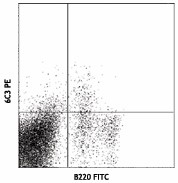
| Cat # | Size | Price | Quantity Check Availability | Save | ||
|---|---|---|---|---|---|---|
| 108307 | 50 µg | 94€ | ||||
| 108308 | 200 µg | 259€ | ||||
Ly-51 is a 140 kD protein also known as 6C3/BP-1. It is a homodimeric cell-surface glycoprotein with aminopeptidase A (APA) activity. Ly-51 is expressed on B cell progenitors, bone marrow stromal cell lines, thymic dendritic cells, and cortical epithelial cells. Ly-51 expression can be upregulated by IL-7 stimulation.
Product DetailsProduct Details
- Verified Reactivity
- Mouse
- Antibody Type
- Monoclonal
- Host Species
- Rat
- Immunogen
- C57BL/6 mouse Pre-B lymphoma cell line (L1-2) plus Abelson murine leukemia virus-specific cytotoxic T-cell clones
- Formulation
- Phosphate-buffered solution, pH 7.2, containing 0.09% sodium azide.
- Preparation
- The antibody was purified by affinity chromatography, and conjugated with PE under optimal conditions.
- Concentration
- 0.2 mg/ml
- Storage & Handling
- The antibody solution should be stored undiluted between 2°C and 8°C, and protected from prolonged exposure to light. Do not freeze.
- Application
-
FC - Quality tested
- Recommended Usage
-
Each lot of this antibody is quality control tested by immunofluorescent staining with flow cytometric analysis. For flow cytometric staining, the suggested use of this reagent is ≤ 0.25 µg per 106 cells in 100 µl volume. It is recommended that the reagent be titrated for optimal performance for each application.
- Excitation Laser
-
Blue Laser (488 nm)
Green Laser (532 nm)/Yellow-Green Laser (561 nm)
- Application Notes
-
Additional reported applications (for the relevant formats) include: immunoprecipitation1,2 and immunohistochemical staining3-5, 7-8 of acetone-fixed frozen sections.
-
Application References
(PubMed link indicates BioLegend citation) -
- Pillemer E, et al. 1984. P. Natl. Acad. Sci. USA 81:4434. (IP)
- Hardy RR, et al. 1991. J. Exp. Med. 173:1213. (IP)
- Adkins B, et al. 1988. Immunogenetics 27:180. (IHC)
- Surh CD, et al. 1992. J. Exp. Med. 176:611. (IHC)
- Goverman J, et al. 1997. Immunol. Today 18:204. (IHC)
- Dumont-Lagace M, 2014. J. Immunol. 192:2219. PubMed
- Kvell K, et al. 2010. PLoS One 5:e10701. (FC, IHC)
- Griewank K, et al. 2007. Immunity 27:751. (FC, IHC)
- Product Citations
-
- RRID
-
AB_313364 (BioLegend Cat. No. 108307)
AB_313365 (BioLegend Cat. No. 108308)
Antigen Details
- Structure
- Aminopeptidase A, 140 kD
- Distribution
-
B progenitors, bone marrow stromal lines, thymic dendritic cells, cortical epithelial cells
- Function
- Aminopeptidase, may function in IL-7-driven proliferation of B cell precursors
- Cell Type
- B cells, Dendritic cells, Epithelial cells
- Biology Area
- Immunology
- Antigen References
-
1. Goverman J, et al. 1997. Immunol. Today 18:204.
2. Morse HC, et al. 1987. J. Exp. Med. 165:920.
3. Sherwood P, et al. 1990. Int. Immunol. 2:399.
4. Lin Q, et al. 1998. J. Immunol. 160:4681. - Gene ID
- 13809 View all products for this Gene ID
- UniProt
- View information about Ly-51 on UniProt.org
Related Pages & Pathways
Pages
Related FAQs
- What type of PE do you use in your conjugates?
- We use R-PE in our conjugates.
Other Formats
View All Ly-51 Reagents Request Custom Conjugation| Description | Clone | Applications |
|---|---|---|
| Biotin anti-mouse Ly-51 | 6C3 | FC |
| FITC anti-mouse Ly-51 | 6C3 | FC |
| PE anti-mouse Ly-51 | 6C3 | FC |
| Purified anti-mouse Ly-51 | 6C3 | FC,IP,IHC-F |
| Alexa Fluor® 647 anti-mouse Ly-51 | 6C3 | FC |
| PE/Cyanine7 anti-mouse Ly-51 | 6C3 | FC |
| PerCP/Cyanine5.5 anti-mouse Ly-51 | 6C3 | FC |
| TotalSeq™-C1034 anti-mouse Ly-51 | 6C3 | PG |
Customers Also Purchased
Compare Data Across All Formats
This data display is provided for general comparisons between formats.
Your actual data may vary due to variations in samples, target cells, instruments and their settings, staining conditions, and other factors.
If you need assistance with selecting the best format contact our expert technical support team.
-
Biotin anti-mouse Ly-51
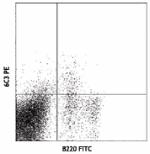
C57BL/6 mouse bone marrow cells stained with 6C3 PE and B220... -
FITC anti-mouse Ly-51
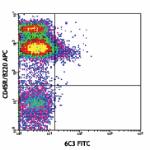
C57BL/6 mouse bone marrow cells were stained with B200 APC a... 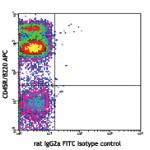
-
PE anti-mouse Ly-51

C57BL/6 mouse bone marrow cells stained with 6C3 PE and B220... -
Purified anti-mouse Ly-51

C57BL/6 mouse bone marrow cells stained with 6C3 PE and B220... -
Alexa Fluor® 647 anti-mouse Ly-51
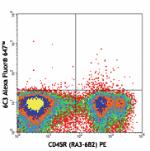
C57BL/6 mouse bone marrow cells stained with CD45R (RA3-6B2)... 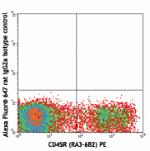
C57BL/6 mouse bone marrow cells stained with CD45R (RA3-6B2)... -
PE/Cyanine7 anti-mouse Ly-51

C57BL/6 mouse bone marrow cells were stained with CD45R FITC... -
PerCP/Cyanine5.5 anti-mouse Ly-51

C57BL/6 mouse bone marrow lymphocytes were stained with CD45... -
TotalSeq™-C1034 anti-mouse Ly-51

 Login / Register
Login / Register 










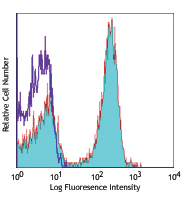

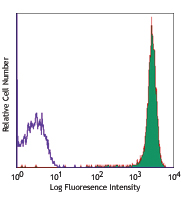
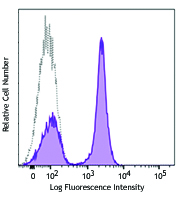





Follow Us